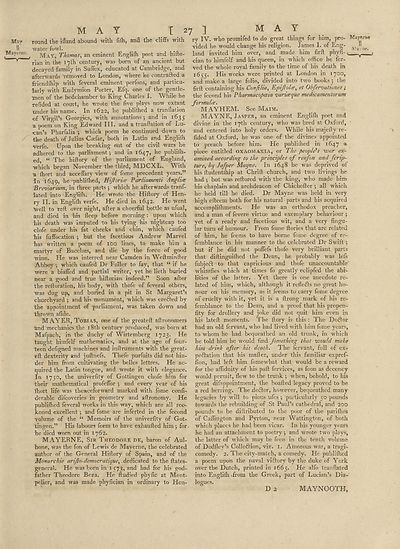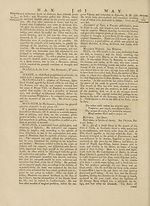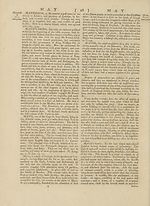Encyclopaedia Britannica, or, a Dictionary of arts, sciences, and miscellaneous literature : enlarged and improved. Illustrated with nearly six hundred engravings > Volume 13, MAT-MIC
(35) Page 27
Download files
Complete book:
Individual page:
Thumbnail gallery: Grid view | List view

MAY
I 27 1
MAY
Mav*
Mayernc.
round the ifland abound with fifti, and the cliffs with
water fowl.
( May, Thomas, an eminent Englifh poet and hifto-
rian in the 17th century, was born of an ancient but
decayed family in Suffex, educated at Cambridge, and
afterwards removed to London, where he contracted a
friendfhip with feveral eminent perfons, and particu¬
larly with Endymion Porter, Efq, one of the gentle¬
men of the bedchamber to King Charles I. While he
refided at court, he wrote the five plays now extant
under his name. In 1622, he publifhed a trantlation
of Virgil’s Georgies, with annotations j and in 1635
a poem on King Edward III. and a tranflation of Lu-
■can’s Pharfalia *, which poem he continued -down to
the death of Julius Caefar, both in Latin and Englifh
verfe. Upon the breaking out of the civil wars he
adhered to the parliament; and in 1647, he publifh¬
ed, “ The hiftory of the parliament of England,
which began November the third, MDCXL. With
a fhort and accelfary view of fome precedent years.”
In 1649, he pablifhed, Hijiorus Parliamenli Anglue
Bi'cviarium, in three parts ; which he afterwards tranf-
lated into Englifh. He wrote the Hiftory of Hen¬
ry II. in Englifh verfe. He died in 1642. He went
■well to reft over night, after a cheerful bottle as ufual,
and died in his fleep before morning: upon which
his death was imputed to his tying his nightcap too
clofe under his fat cheeks and chin, which caufed
his fuffocation ; but the facetious Andrew Marvel
has written a poem of 1C0 lines, to make him a
martyr of Bacchus, and die by the force of good
wine. He was interred near Camden in Weftminfter
Abbey ; which caufed Dr Fuller to fay, that “ if he
were a biafled and partial writer, yet he lieth buried
near a good and true hiftorian indeed.” Soon after
the reiteration, his body, with thofe of feveral others,
was dug up, and buried in a pit in St Margaret’s
churchyard ; and his monument, which was erefted by
the appointment of parliament, w'as taken down and
thrown afide.
MAYER, Tobias, one of the greateft aftronomers
■and mechanics the 18th century produced, was born at
Mafpach, in the duchy of Wirtemberg 1723. He
taught himfelf mathematics, and at the age of four¬
teen defigned machines and inftruments with the great-
eft dexterity and juftnefs. Thefe purfuits did not hin¬
der him from cultivating the belles lettres. He ac¬
quired the Latin tongue, and wrote it with elegance.
In 1750, the univerfity of Gottingen chofe him for
their mathematical profeflbr ; and every year of his
fhort life was thenceforward marked with fome confi-
derable difeoveries in geometry and aftronomy. He
publifhed feveral works in this way, which are all rec¬
koned excellent ; and fome are inferted in the feeond
volume of the Memoirs of the univerfity of Got¬
tingen.” His labours feem to have exhaufted him; for
he died worn out in 1762.
MAYERNE, Sir Theodore de, baron of Aul-
bone, was the fon of Lewis de Mayerne, the celebrated
author of the General Hiftory of Spain, and of the
Monarchic arijlo-democratique, dedicated to the ftates-
general. He was born in 1 C73, and had for his god¬
father Theodore Beza. He ftudied phyfic at Mont¬
pelier, and was made phylician in ordinary to Hen¬
ry IV. who promifed to do great things for him, pro¬
vided he would change his religion. James I. of Eng¬
land invited him over, and made him firft phyfi-
cian to himfelf and his queen, in which office he fer-
ved the whole royal family to the time of his death in
1655. His works were printed at London in 1700,
and make a large folio, divided into two books ; the
firft containing his Confilia, EpiJIoU, ct Ohfervationes ;
the fecond his Pharmacopoeia variaque medicamentorum
formulce.
MAYHEM. See Maim.
MAYNE, Jasper, an eminent Engliffi poet and
divine in the 17th century, who was bred at Oxford,
and entered into holy orders. While his majefty re-
fided at Oxford, he w-as one of the divines appointed
to preach before him. Fie publiihed in 1647 a
piece entitled OXAOMAXIA, or The people's war ex¬
amined according to the principles of reafon and ferip-
ture, by Jafper Mayne. In 1648 he was deprived of
his ftudentftiip at Chrift church, and two livings he
had ; but wras reftored with the king, who made him
his chaplain and archdeacon of Chichefter ; all which
he held till he died. Dr Mayne was held in very
high efteem both for his natural parts and his acquired
accompli(liments. He was an orthodox preacher,
and a man of fevere virtue and exemplary behaviour ;
yet of a ready and facetious wit, and a very Angu¬
lar turn of humour. From fome ftories that are related
of him, he feems to have borne fome degree of re-
femblance in his manner to the celebrated Dr Swift ;
but if he did not poffefs thofe very brilliant parts
that diftinguiftied the Dean, he probably was lefs
fubjecl - to that capricious and thofe unaccountable
whimfies which at times fo greatly eclipfed the abi¬
lities of the latter. Yet there is one anecdote re¬
lated of him, which, although it reflecls no great ho¬
nour on his memory, as it feems to carry fome degree
of cruelty with it, yet it is a ftrong mark of his re-
femblance to the Dean, and a proof that his propen-
fity for drollery and joke did not quit him even in
his lateft moments. The ftory is this : The Doflor
had an old fervant, wrho had lived with him fome years,
to whom he had bequeathed an old trunk, in which
he told him he would find fomething that would make
him drink after his death. The fervant, full of ex¬
pectation that his mafter, under this familiar expref-
fion, had left him fomewhat that would be a reward
for the affiduity of his part fervices, as fcon as decency
would permit, flew to the trunk ; when, behold, to his
great difappointment, the boafted legacy proved to be
a red herring. The doctor, however, bequeathed many
legacies by will to pious ufes ; particularly 50 pounds
towards the rebuilding of St Paul’s cathedral, and 200
pounds to be diftributed to the poor of the parifties
of Caffington and Pyrton, near Wattington, of both
which places he had been vicar. In his younger years
he had an attachment to poetry ; and wrote two plays,
the latter of which may be feen in the tenth volume
of Dodftey’s Collection, viz. 1. Amorous war, a tragi¬
comedy. 2. The city-match, a comedy. He publifhed
a poem upon the naval victory by the duke of York
over the Dutch, printed in 1665. He alfo tranflated
into Englifh -from the Greek, part of Lucian’s Dia¬
logues.
D 2
Mryerria
iVa-. ne.
MAYNOOTH,
I 27 1
MAY
Mav*
Mayernc.
round the ifland abound with fifti, and the cliffs with
water fowl.
( May, Thomas, an eminent Englifh poet and hifto-
rian in the 17th century, was born of an ancient but
decayed family in Suffex, educated at Cambridge, and
afterwards removed to London, where he contracted a
friendfhip with feveral eminent perfons, and particu¬
larly with Endymion Porter, Efq, one of the gentle¬
men of the bedchamber to King Charles I. While he
refided at court, he wrote the five plays now extant
under his name. In 1622, he publifhed a trantlation
of Virgil’s Georgies, with annotations j and in 1635
a poem on King Edward III. and a tranflation of Lu-
■can’s Pharfalia *, which poem he continued -down to
the death of Julius Caefar, both in Latin and Englifh
verfe. Upon the breaking out of the civil wars he
adhered to the parliament; and in 1647, he publifh¬
ed, “ The hiftory of the parliament of England,
which began November the third, MDCXL. With
a fhort and accelfary view of fome precedent years.”
In 1649, he pablifhed, Hijiorus Parliamenli Anglue
Bi'cviarium, in three parts ; which he afterwards tranf-
lated into Englifh. He wrote the Hiftory of Hen¬
ry II. in Englifh verfe. He died in 1642. He went
■well to reft over night, after a cheerful bottle as ufual,
and died in his fleep before morning: upon which
his death was imputed to his tying his nightcap too
clofe under his fat cheeks and chin, which caufed
his fuffocation ; but the facetious Andrew Marvel
has written a poem of 1C0 lines, to make him a
martyr of Bacchus, and die by the force of good
wine. He was interred near Camden in Weftminfter
Abbey ; which caufed Dr Fuller to fay, that “ if he
were a biafled and partial writer, yet he lieth buried
near a good and true hiftorian indeed.” Soon after
the reiteration, his body, with thofe of feveral others,
was dug up, and buried in a pit in St Margaret’s
churchyard ; and his monument, which was erefted by
the appointment of parliament, w'as taken down and
thrown afide.
MAYER, Tobias, one of the greateft aftronomers
■and mechanics the 18th century produced, was born at
Mafpach, in the duchy of Wirtemberg 1723. He
taught himfelf mathematics, and at the age of four¬
teen defigned machines and inftruments with the great-
eft dexterity and juftnefs. Thefe purfuits did not hin¬
der him from cultivating the belles lettres. He ac¬
quired the Latin tongue, and wrote it with elegance.
In 1750, the univerfity of Gottingen chofe him for
their mathematical profeflbr ; and every year of his
fhort life was thenceforward marked with fome confi-
derable difeoveries in geometry and aftronomy. He
publifhed feveral works in this way, which are all rec¬
koned excellent ; and fome are inferted in the feeond
volume of the Memoirs of the univerfity of Got¬
tingen.” His labours feem to have exhaufted him; for
he died worn out in 1762.
MAYERNE, Sir Theodore de, baron of Aul-
bone, was the fon of Lewis de Mayerne, the celebrated
author of the General Hiftory of Spain, and of the
Monarchic arijlo-democratique, dedicated to the ftates-
general. He was born in 1 C73, and had for his god¬
father Theodore Beza. He ftudied phyfic at Mont¬
pelier, and was made phylician in ordinary to Hen¬
ry IV. who promifed to do great things for him, pro¬
vided he would change his religion. James I. of Eng¬
land invited him over, and made him firft phyfi-
cian to himfelf and his queen, in which office he fer-
ved the whole royal family to the time of his death in
1655. His works were printed at London in 1700,
and make a large folio, divided into two books ; the
firft containing his Confilia, EpiJIoU, ct Ohfervationes ;
the fecond his Pharmacopoeia variaque medicamentorum
formulce.
MAYHEM. See Maim.
MAYNE, Jasper, an eminent Engliffi poet and
divine in the 17th century, who was bred at Oxford,
and entered into holy orders. While his majefty re-
fided at Oxford, he w-as one of the divines appointed
to preach before him. Fie publiihed in 1647 a
piece entitled OXAOMAXIA, or The people's war ex¬
amined according to the principles of reafon and ferip-
ture, by Jafper Mayne. In 1648 he was deprived of
his ftudentftiip at Chrift church, and two livings he
had ; but wras reftored with the king, who made him
his chaplain and archdeacon of Chichefter ; all which
he held till he died. Dr Mayne was held in very
high efteem both for his natural parts and his acquired
accompli(liments. He was an orthodox preacher,
and a man of fevere virtue and exemplary behaviour ;
yet of a ready and facetious wit, and a very Angu¬
lar turn of humour. From fome ftories that are related
of him, he feems to have borne fome degree of re-
femblance in his manner to the celebrated Dr Swift ;
but if he did not poffefs thofe very brilliant parts
that diftinguiftied the Dean, he probably was lefs
fubjecl - to that capricious and thofe unaccountable
whimfies which at times fo greatly eclipfed the abi¬
lities of the latter. Yet there is one anecdote re¬
lated of him, which, although it reflecls no great ho¬
nour on his memory, as it feems to carry fome degree
of cruelty with it, yet it is a ftrong mark of his re-
femblance to the Dean, and a proof that his propen-
fity for drollery and joke did not quit him even in
his lateft moments. The ftory is this : The Doflor
had an old fervant, wrho had lived with him fome years,
to whom he had bequeathed an old trunk, in which
he told him he would find fomething that would make
him drink after his death. The fervant, full of ex¬
pectation that his mafter, under this familiar expref-
fion, had left him fomewhat that would be a reward
for the affiduity of his part fervices, as fcon as decency
would permit, flew to the trunk ; when, behold, to his
great difappointment, the boafted legacy proved to be
a red herring. The doctor, however, bequeathed many
legacies by will to pious ufes ; particularly 50 pounds
towards the rebuilding of St Paul’s cathedral, and 200
pounds to be diftributed to the poor of the parifties
of Caffington and Pyrton, near Wattington, of both
which places he had been vicar. In his younger years
he had an attachment to poetry ; and wrote two plays,
the latter of which may be feen in the tenth volume
of Dodftey’s Collection, viz. 1. Amorous war, a tragi¬
comedy. 2. The city-match, a comedy. He publifhed
a poem upon the naval victory by the duke of York
over the Dutch, printed in 1665. He alfo tranflated
into Englifh -from the Greek, part of Lucian’s Dia¬
logues.
D 2
Mryerria
iVa-. ne.
MAYNOOTH,
Set display mode to:
![]() Universal Viewer |
Universal Viewer | ![]() Mirador |
Large image | Transcription
Mirador |
Large image | Transcription
Images and transcriptions on this page, including medium image downloads, may be used under the Creative Commons Attribution 4.0 International Licence unless otherwise stated. ![]()
| Permanent URL | https://digital.nls.uk/192661617 |
|---|
| Attribution and copyright: |
|
|---|
| Description | Ten editions of 'Encyclopaedia Britannica', issued from 1768-1903, in 231 volumes. Originally issued in 100 weekly parts (3 volumes) between 1768 and 1771 by publishers: Colin Macfarquhar and Andrew Bell (Edinburgh); editor: William Smellie: engraver: Andrew Bell. Expanded editions in the 19th century featured more volumes and contributions from leading experts in their fields. Managed and published in Edinburgh up to the 9th edition (25 volumes, from 1875-1889); the 10th edition (1902-1903) re-issued the 9th edition, with 11 supplementary volumes. |
|---|---|
| Additional NLS resources: |
|

